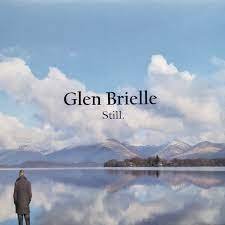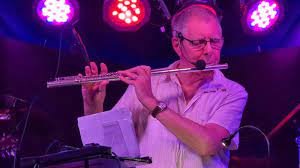LIFE AFFIRMING & ESSENTIAL
Glen Brielle with the release of debut album Still is the solo output of multi-instrumentalist Hugh Carter, known to progressive rock fans as a founding member of Scottish pioneers, Abel Ganz. He left the band in 2011, but they are still a going concern, and, indeed, The Life of the Honeybee and Other Moments of Clarity was a highlight of 2020.
There is a backstory to this album, and, indeed, to this review of the album. I will go back to front, as it were, and introduce the review bit first. I make a rule of not criticising other review websites here, because such actions can come back to bite you. So, without naming the site, I did see a critical review and Hugh’s very understandable reaction, and I will restrict myself to saying that context is everything. It is not crucial for a reviewer to necessarily understand the literal meaning behind a lyric (because many times the writer will deliberately leave that to individual interpretation), but certainly it is to consider the context and situation behind an album, whether it be personal circumstances, choices of collaborators & etc., and I have to say that the reviewer concentrated on the voices in the album (he didn’t like them) without providing any context, and it did him and the site no credit whatsoever. I reached out to Hugh, and he kindly agreed to provide a review copy of the CD.
Carter had wanted to continue recording following his departure from Abel Ganz. He had prepared some demos as far back as 2012, but in 2016, he was hit with a bombshell – the diagnosis of Stage IV lung cancer, so serious one can expect about six months of life and no expectation of a cure. Incidentally, Hugh was not a smoker, but had played gigs in smoky bars over the years, so very reminiscent of the circumstances behind the late, great, Roy Castle. Hugh himself describes his voice even before the illness as being fragile, and the ravages of cancer and treatment will not have helped matters.
“In the manner of the prisoner taking a hearty meal before the gallows”, Carter was allowed to take a holiday before commencing chemotherapy and he and his wife, Maria, did the Scotland North Coast 500 route – stunning and inspirational for this and promised future works.
There is a wee sequel to this, but later. Let us first discuss a wonderful album which contains eleven tracks from Dawn to Dusk. You can apply many words to it. Bucolic is one which comes to mind. Pastoral is another, but the overwhelming (modern) word which comes to me is mindful. This is an album which takes you to a very special and calm place – it should be played in the morning to every schoolchild in the country – you would soon eliminate a whole host of mental, emotional, and behavioural issues (any teachers reading this, take note). It is a folk album in the truest sense, a work about personal identity, inspired by places and culture, and speaking to experience.
Dawn brings with it birdsong and orchestral arrangements based upon Delius with the assistance of Alan Heartson. The reeds are sumptuous.
The Thatcher (with yellowhammer birdsong) sees Hugh playing guitars, keys, treble recorder, and percussion. Just over fives minutes long, this is gorgeous, especially the recorder. It is a song that does not merely yearn for craft and professions almost lost, but tells of a certainty, which I share, of them returning to our lives. The song references the yellowhammers constant refrains and I guarantee that those of you who, as I do, adore the rural worlds created by Ian Anderson especially in Heavy Horses, but generally that mid-1970’s folk period of his, will find so much to love here, because Carter creates this idyll for us and paints a picture of people who have passed, who still work, and are yet to come.
Mr Valentine follows. Carter wrote the words based upon a short story by Sophie Hampshire. The eponymous V brings joy to the face of woe and is everywhere you go. Carter observes this life from a faraway place, and Mr V takes him on that journey to a better place, lightening the load and turning the world into a magical place. This piece tells me of a man recreating a childhood sense of wonder whilst facing a shocking truth of mortality. The violin of Fiona Cuthill (who has played with Abel Ganz) is playful in that childish sense, a Celtic treat alongside the whirling whistles and a bassline which is marvellously melodious.
The next song, Thankful, is a highlight of not only 2023, but many years’ worth of listening to music. There are three songs in my collection which are guaranteed to turn the tear ducts onto full intensity. Mother by Judie Tzuke, Soulprint for Mother by Introitus (both for rather obvious reasons), and Victorian Brickwork by Big Big Train owing to the memory of my departed dear friend, Keri. I think that this one is right up there. I have embedded this beautiful and loving work below for you to enjoy. Daughter Bee provides the female voice here and cowrote the lyrics, and the pair of them provide such a touching paeon to family love, respect, and the need to be thankful for what we have and what is yet to come. Context. Understand the context, and this gorgeous piece of music touches one deeply. Just be thankful. Just be mindful. When Bee enters with “hush now” she brings with her a love and respect you can feel through the speakers, and Carter’s voice is noticeably more fragile alongside it, and this cannot be an accident. Musically, the song’s strength is in its relative simplicity. I really like the keyboard solo some four minutes in which delivers without the need for flare and histrionics. The spoken “we’ll be alright” delivered at the close provides more clout than a thousand berks you see on the television nightly.
Crowsley Park Wood follows. Crowsley Park is, in fact, based in Oxfordshire and is used by the BBC in its international broadcast and signalling monitoring duties. The song gives us journeys through the rural idyll. Cuthill returns on violin, whilst we also have Jack Webb on Hammond organ, and Pippa Reid-Foster on harp, not forgetting the skylark birdsong. It is a folk music fan’s delight. It is so utterly relaxing and full of life. I like the way that the harmonica just over three minutes in heralds, in true prog fashion, a distinct change in direction segueing into an extended piece by Webb accompanied by a gentle acoustic guitar and those gorgeous birds. When listening to this, you are there, and the final ninety seconds unashamedly wallows in remembrance.
Heart Lies is up next. Ruth Rowlands provides a distinctly mournful cello as the song provides for a meditation on introspection before at the close forcibly picking the subject up and alive. Listen below.
There are two cat songs on the album. First up is The Cat that Played with the Wind. It is an instrumental with Carter playing harmonica accompanied by keyboards and some playful percussion. As I write this, the feline member of the Lazland menagerie has just refused to come in and departed to the garden with a look of satisfied menace in her eyes, and this piece portrays the singular mind of the cat very well.
Slumber Sweetly again features Bee and this time her sister Sophie as a heavenly choir (and a fine noise is made, too). Abel Ganz alumni Malcolm McNiven and Denis Smith appear on guitar and drums respectively, whilst Deepak Bahl plays bass. There are peacock birdsongs, Bollywood vocal samples, and this is a piece inspired by Carter’s wife Maria’s Sri Lankan homeland (incidentally, she provided not merely such inspiration, but also photography and artwork for the album, which is lovely). It is the longest, and only epic length, track on the album. It is an interesting piece, essentially a love song as the subject looks on the love of his life. Musically, it is a bit of a smorgasbord. There are some clear Genesis influences, a hint of Forever Autumn, some jazz-infused passages, eastern promise, and some very playful moments reminding one of an eccentricity unique to these islands (rowing with Sachin Tendulkar, indeed), and the chorus of “strange how these things go, holding onto the undertow” is simply beautifully sung with a fragility which I love in a lot of my music. The closing segment drips with love and is wonderful.
This is followed by a second mog song, The Cat that Walked by Herself. Carter’s eastern infused flute is full of the mysteries of his wife’s culture and as it progresses, you see the cat wondering amongst the singers and players and avoiding an elephant on its journey. A fantastic piece, with some very impressive vocal samples, it is embedded below, and the fact that Carter plays everything on this from flute to electric sitar to bass guitar, by way of balaika and percussion, is as clear an indication of the talent inherent in the man.
The penultimate track is Moving On, a delicate folk piece with the returning Cuthill & Reid-Foster and some eider ducks. Close your eyes and hear yourselves walking along the shore or rivers edge in moments of sheer tranquillity and happiness.
We close with Dusk, the nighttime enveloping us in the company of a classical guitar solo, keyboard winds, and tawny owls.
Still is one of those rarities – an album which fills you with life affirming energy, a work which tells you that despite the worst fate can throw at you, everything will be alright, here or after.
As for that sequel, well... As chemotherapy started, Hugh began a somewhat urgent set of recordings, as life was now too short, literally, not figuratively. In 2018, he was left with no more treatment options. However, then along came a revolutionary new drug in the UK which had seen success in the USA – you know, the type of headline and health story you read in the newspapers every single morning but take virtually no notice of. The drug stabilises the tumours of patients with a certain strain of lung cancer – Hugh Carter has that strain. He is now looking to the future, and that, thankfully, includes further trips to inspire more music.
I have said before on this website that I am a lucky man indeed, being sent music from around the world to enable me to share with likeminded lovers of intelligent music my thoughts. Never has that been truer than with Still.
Get along to https://glenbrielle.bandcamp.com/album/still This is a very special work indeed, and you will come out the other side invigorated, I promise.
Context.
As ever, please support the artist by buying their albums. If you like this review, why not click on the icon above and receive regular updates for what this website does by following us on Facebook?


